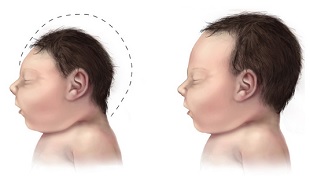 A baby with microcephaly (left) compared to a baby with a typical-sized head (right)WIKIMEDIA, CDCMore than one-quarter of women taking part in a study of Zika infection during pregnancy had fetuses with potentially serious abnormalities, according to a report published last week (March 4) in the New England Journal of Medicine. The analysis compared fetuses in infected mothers to fetuses in non-infected mothers, thereby providing the control-like group that many previous studies have lacked.
A baby with microcephaly (left) compared to a baby with a typical-sized head (right)WIKIMEDIA, CDCMore than one-quarter of women taking part in a study of Zika infection during pregnancy had fetuses with potentially serious abnormalities, according to a report published last week (March 4) in the New England Journal of Medicine. The analysis compared fetuses in infected mothers to fetuses in non-infected mothers, thereby providing the control-like group that many previous studies have lacked.
The analysis is “what people have been waiting for,” Amesh Adalja of the University of Pittsburgh Medical Center, who was not involved in the work, told LiveScience, adding that the comparison of the two groups allowed stronger links to be drawn between Zika infection and microcephaly. “This is the closest we’ve gotten to [proving] causation. . . . For all intents and purposes, this justifies the concern raised early on.”
Of the 88 women enrolled in the study, 72 tested positive for Zika virus infection. While examination of the fetuses of all Zika-negative women found no defects, examinations of the fetuses in 42 Zika-infected women revealed abnormalities in 12, including central nervous system lesions (seven fetuses) and growth restriction with or without microcephaly (five fetuses). ...




















